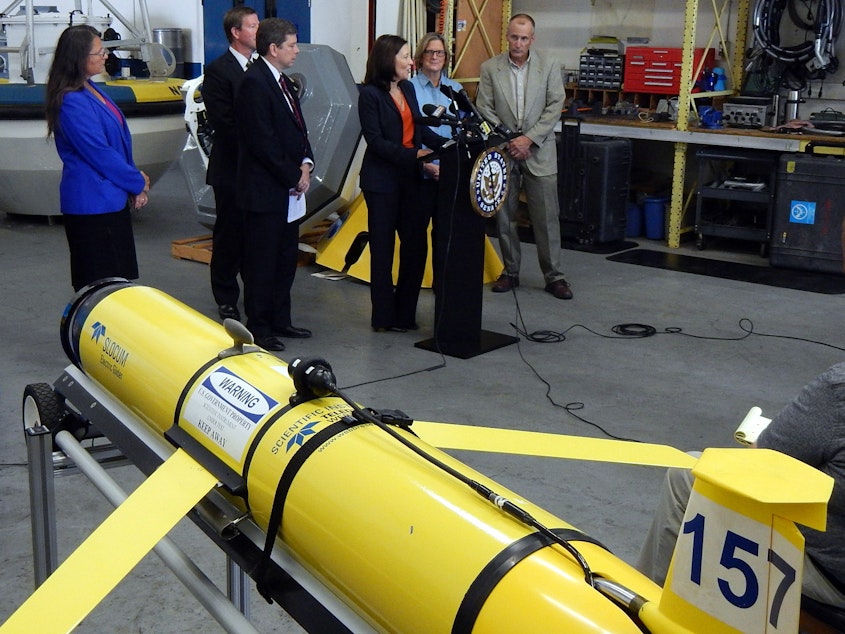Cantwell: Shellfish Growers Are The Canary In The Coal Mine

Senators Maria Cantwell (D-Washington) and Mark Begich (D-Alaska) are calling for a national strategy to respond to ocean acidification and protect the nation's fishing industry.
On Monday, the senators called for federal funding for a national network of ocean-going devices — from high-tech buoys to aquatic drones that resemble small yellow missiles — to track just how fast the world’s oceans are turning sour.
Such devices are being developed at the National Oceanic and Atmospheric Administration's Pacific Marine Environmental Laboratory in Seattle, where the senators spoke on Monday.
Ocean acidification is sometimes called the evil twin of climate change: Both are caused by rising amounts of carbon dioxide in the atmosphere. More CO2 dissolved in the water is making it harder for many creatures to form shells.
Cantwell said the rising acidity of the world’s oceans needs to be a national priority for economic reasons. “Ocean acidification is a jobs issue," Cantwell said. "Shellfish growers are the canary in the coal mine.”
She said the small number of acid-monitoring devices already deployed along the Washington coast has already saved jobs in the shellfish industry.
Now, some oyster farmers can react quickly by adding acid-neutralizing baking soda to their water supplies when they see pulses of especially acidic water hitting their hatcheries.
Bill Dewey with Taylor Shellfish of Shelton, Wash., said his industry was one of the first in world to be affected by ocean acidification — and actually know it.
"That’s because of the data we’ve been able to collect and see the seawater chemistry that’s coming into our hatchery and killing our oyster larvae," he said.
By next year, scientists expect Washington oyster growers will be able to use acidity forecasts the way farmers rely on daily weather forecasts.
Such forecasts can't help the oysters once they leave the controlled environment of a hatchery, and many more ocean fisheries and species are at risk.
“The fact that these pteropod, which is what salmon eat, aren't forming shells, is a very big problem for us,” Cantwell said.
Cantwell and Begich said a nationwide network of drones and buoys could serve as a sort of early-warning system for industries threatened by acidification.
"More science, better science, is good business," said Begich.
Such a network would not address what University of Washington oceanographer Jan Newton called the top priority when it comes to ocean acidification.
"From a scientist's perspective, there is no doubt that ocean acidification is caused by the buildup of CO2," Newton said. "Curtailing that is the number-one most important thing to do for ocean acidification."
Carbon Emissions
China and the United States are the leading sources of the world's carbon dioxide emissions. Environmental activists concerned about American CO2 emissions have focused on pressuring the Obama administration to block construction of the Keystone XL oil pipeline from Canada to refineries on the Texas Gulf Coast.
Cantwell declined to take a position on the Keystone pipeline. "I’m willing to continue to let the White House decide on this," she told reporters on Monday.
Begich supports completion of the pipeline as well as proposed oil drilling in the Arctic Ocean.
"For us to pretend that suddenly oil and gas will disappear overnight would be a mistake," he said.
President Obama said last year the State Department would allow the Keystone XL pipeline to be built “only if this project does not significantly exacerbate the problem of carbon pollution.”
A new study by Seattle-based researchers with the Stockholm Environment Institute said the pipeline's effect on global carbon emissions would be four times worse than what the State Department estimated earlier this year.

